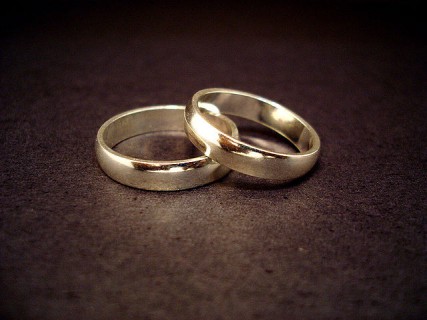Editor's note: This post was inspired by this week's Viewpoints question: What is marriage?

What is marriage? From a Catholic perspective, marriage is a covenant relationship between one man and one woman reflecting the covenant between God and human. Like the divine covenant, marriage ideally creates and sustains a bond that is eternal, always faithful and fruitful. The union of one man and one woman is like a new creation into which the divine is welcomed as life is created, renewed and reconciled. While fruitfulness often refers to children it can also mean the witness of united fidelity to the community and the trust in God.
Catholics maintain the one man to one woman idea in marriage because of our traditional interpretation of Genesis 2:18, 21:24 and the concept of divine/natural law manifested in gender complementarity. For a long time, the fruitfulness part of the marriage was paramount and trumped understanding of the unifying purpose of sexuality and intimacy in marriage as well as its meaning in a community as a symbol of fidelity, perseverance and reconciliation. Truly like the covenant between God and human, a marriage showcases unconditional love and patience.
Luckily the middle of the 20th century saw Catholic theologians reiterate the tradition of love and sexuality being a gift that brought people together regardless of conception so that the thousands of married couples who struggled with infertility or other issues that complicated procreation were able to see their relationships equally sacred and in the mode of the covenant. Gender complementarity remains the mainstay of the marriage concept.
Catholics also believe that marriage is a vocation where a person is called specifically by God to be married, and that married life is sacramental. Marriage is sacramental because its foundation is supposed to be a relationship to Christ and the prayer that the Holy Spirit is dynamic within the marriage as in the trinity. Both the liturgy of marriage and the life of marriage are imbued with sacramental grace that helps the couple honor their vows.
The issue with gay marriage for many Catholics, regardless of how they feel about the spiritual gift of sexuality within a marriage, is that gay marriage is not by physical mechanics open to procreation. Although procreation is one of many aspects that are important to marriage, the theoretical non-possibility of conception during the sexual act between same-sex partners renders the word “marriage” inapplicable to gay unions.
It is not unusual to find Catholics who support gay civil rights and even civil unions but draw the line at using the word “marriage.” They are protecting the central idea that marriage is for procreation first, and then the other stuff of value comes into play. It makes for strange tidings when Catholics are equally supportive of single parenting if through male-female coitus as they are dismissive of same sex couples parenting as a result of technological reproduction or even adoption. At some point we have to move beyond the idea of how babies are born and how people perform sexual acts so that we can look at what makes love last in a family, between two people and between parents and children.
As a Catholic I wonder if God meant for us to believe that homosexuality is wrong and that maybe all of the Scripture that appears to condemn it is more about any wasted, selfish sexual act and objectification regardless of gender or legal status. After all, the reason Catholics object to homosexuality is the same one that is involved in opposition to contraception and sterilization — that the theoretical possibility of conception has to always be present in order for any sexual act to be sacred in the eyes of God.
We are really worried about sex and God. We are so anxious about it that we pay a lot attention to each other’s private lives and fear that private sexual intimacy is more dangerous that public stupidity. What would happen if we chilled out? What would happen if gay people could be married to one another? If the end of the world comes about because of legalized gay marriage and not because of the Holocaust, genocide in Rwanda, and global complicity in the starvation of North Koreans…I am going to have a serious bone to pick with God. Am I being a good Catholic? I am not sure but I sure am making my conscience work overtime.







تحميل الانستقرام للكمبيوتر igtv
devin physique